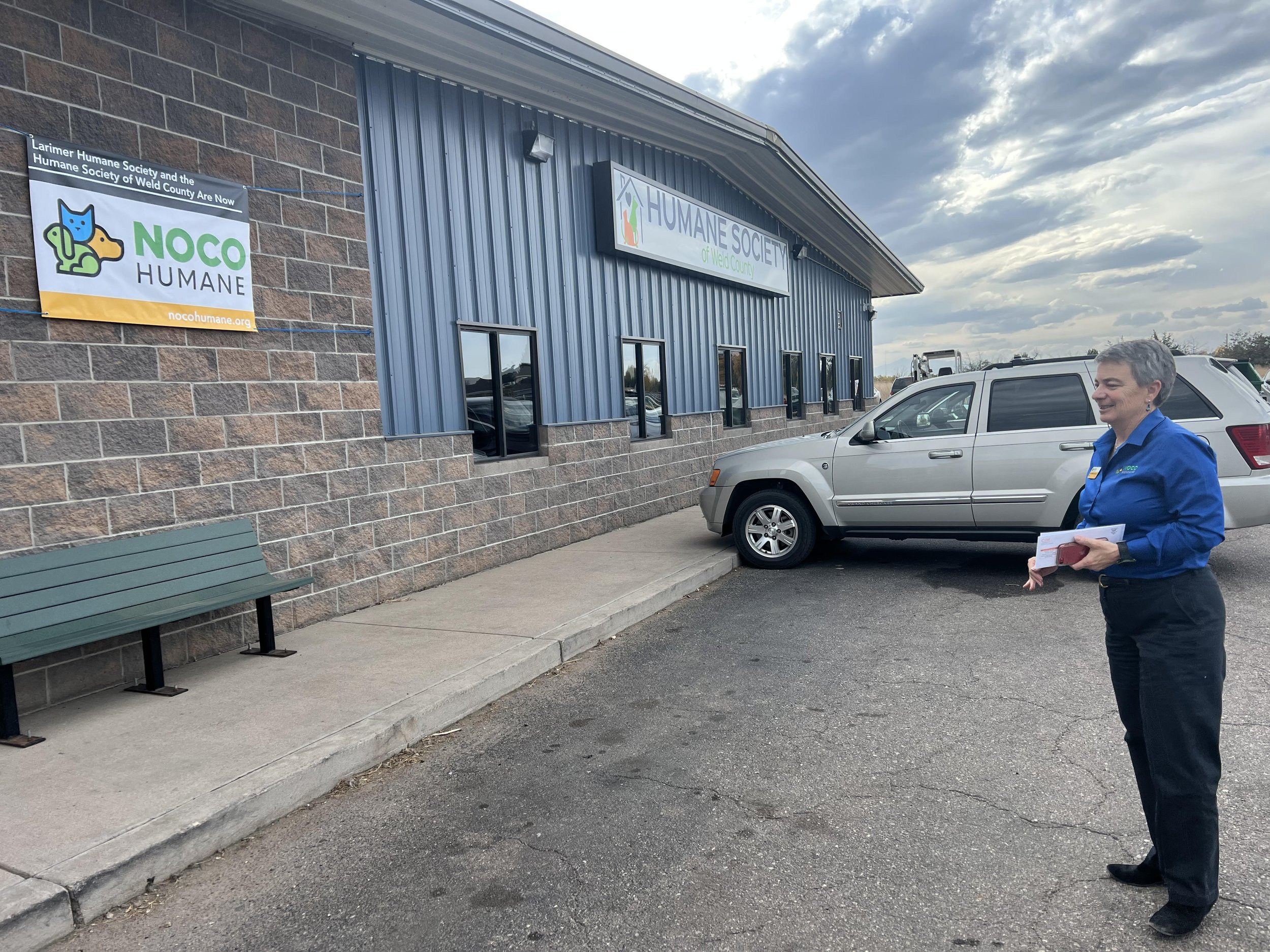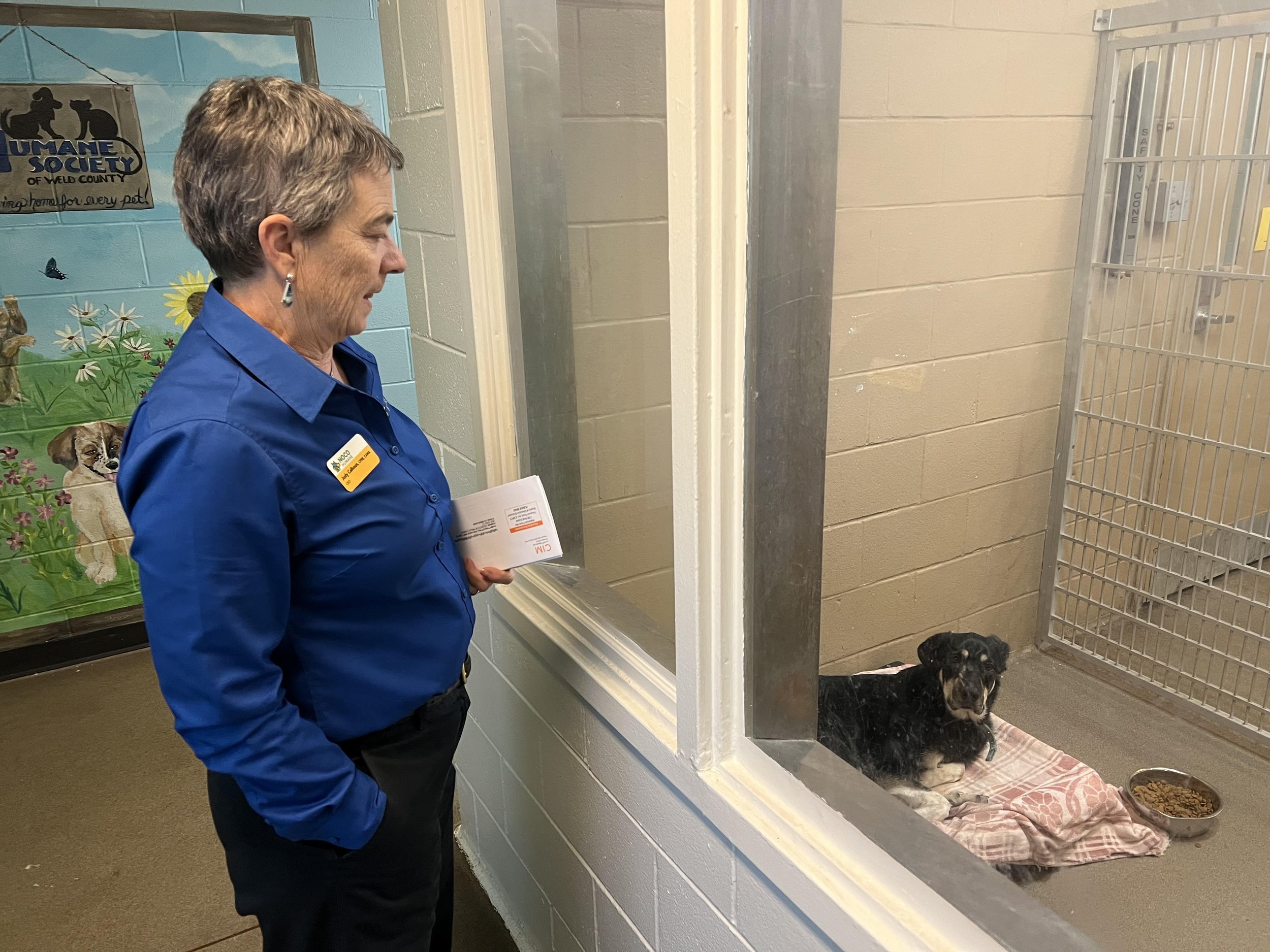Weld County Humane Society budget woes leads two counties to merge into one pack
Judy Calhoun, CEO of NOCO Humane Society, spent 15 of her 30 years in animal welfare as executive director for Larimer County’s shelter. An unusual merger between the Weld County and Larimer County humane societies began nearly a year ago. Photo by Dan England.
By Dan England
The unusual merger between the Weld County and Larimer County humane societies began nearly a year ago with a phone call to Weld from Judy Calhoun. She had one simple question: What’s going on?
It was a tough time for animal shelters — it still is — and Larimer, like many shelters, was struggling with a massive increase in intake. Intake essentially means more animals to care for, and they were coming from more strays as well as more owners surrendering pets, the end result of what was once a feel-good pandemic story about people adopting more animals and, to a lesser degree, a housing crises that left some people without a place to keep their pets.
Calhoun, CEO of NOCO Humane, called because 20 percent of Larimer County’s intake was coming from Weld, and quite frankly, it was a huge burden. Larimer had its own increase to worry about, but Weld’s was, essentially, a 20 percent additional increase. Calhoun had to find out why people from Weld were surrendering their pets nearly an hour away. The answer shocked her: Weld wasn’t accepting any new surrenders from its own population. Calhoun knew she had a bigger problem than even she could imagine.
The result is the NOCO Humane, a recent name change that reflects the merger of the two shelters as well as Larimer County’s desire to reach out to Weld residents and reassure them they aren’t going to play second fiddle to Fort Collins or Loveland. She knows why Weld residents might think that, with the takeover, reduced hours and a fear that Larimer won’t recognize the unique needs of an agricultural county. So far, though, things seem copacetic.
“What we’ve heard so far from Weld residents has been really positive, and I appreciate that,” Calhoun says. “I’d ask the community here to continue to be patient with us. We will operate a Weld County shelter. But we could have used nine months to make this change. We did it in four.”
Money woes strangle Weld
Calhoun spent 15 of her 30 years in animal welfare as executive director for the shelter in Larimer County. She’s one of the rare people in animal rescue who enjoys working with people as much as she does animals.
“Sometimes I wonder if I’m crazy,” Calhoun said. “But I love the work. We have a responsibility to make sure our animals are well cared for. Animals raise a lot of emotions in people.”
The reason for those strong emotions, Calhoun said, is because animals can’t advocate for themselves in a philosophical way. They can’t say what fulfills their lives, or how much or how little they need to be happy.
“So we all think we know what’s best for them,” she said. “That’s when it gets challenging.”
But the one thing that helps Calhoun get through the many difficult situations with people is all those emotions come from a place of wanting to do the best thing for the animals. This is why, when Weld delivered the blow that they weren’t accepting surrenders any longer, Calhoun offered her help, despite the huge problem this caused for her shelter. She knew, because of her experience and her philosophy, Weld’s shelter board wouldn’t do that unless things were really bad.
They were bad, even with the fact that many of the same challenges were what Larimer was facing as well, in addition to shelters all over the country.
The pandemic influenced a historic high in adoptions and drop in intake, but by 2022, things returned to normal and then some. Strays and surrenders increased by 25 percent, and Weld was trying to handle the enormous increase with a budget that was a third of Larimer’s. Calhoun, speaking in the typical understated way of an executive, called Weld’s budget woes “challenging.”
Weld wasn’t getting enough funding from its government entities. Shelters are typically underfunded from governments that usually don’t understand the costs of caring for dozens of animals in a humane way, Calhoun said. She was experienced enough to know how to present an accurate budget to governments, and as a result, the funding for the Weld side has improved, she said.
At the time, though, the thin budget also meant Weld had no good way to raise extra money. Shelters are essentially funded by government contracts -- they take care of strays and handle adoptions so the government doesn’t have to do that, but they also need to raise a lot of money to thrive. Larimer’s development staff’s job was to do exactly that. Weld had a limited, if non-existent, development staff.
NOCO Humane Society CEO Judy Calhoun said no one person could have fixed Weld County’s budget woes. Photo by Dan England.
Turnover was also a huge issue for Weld. Shelter workers typically love animals, but it’s an unglamorous grind: The work usually means cleaning out kennels, feeding and watering, limited walks and lots of picking up poop. Weld’s low salaries caused a lot of turnover at a time when, eventually, workers realized they could work at cleaner and less backbreaking jobs for a lot more money. As a result, the shelter was understaffed.
“It’s not just playing with puppies and kittens,” Calhoun said.
All that, and the shelter was operating out of an aging building. This is more problematic than you might think: Calhoun breathes sighs of relief every day at the fact that Larimer built a new facility in 2017. The intake crises would have crushed them, too, if they had been operating out of their old building, she said.
“If we hadn't done that,” Calhoun said, “we’d be up a creek.”
All this makes it understandable why Weld went through many executive directors and personnel issues: They were in constant triage, Calhoun said. She can say this because after Larimer did its due diligence while it pondered a merger, they found no wrongdoing in Weld’s shelter operations. It’s not like the money was being mismanaged. It just wasn’t there. The intake crisis was the last straw.
But accepting animal surrenders is one of the basic and arguably the most important jobs of a shelter. Desperate pet owners may just dump their animal as a result or travel to shelters outside their county, possibly causing a budget crisis for those shelters. That could have happened to Larimer, but it was fortunate to have a healthy stream of donations and volunteers and was well funded by its governments, in addition to $13 million in reserves, Calhoun said.
It could handle Weld’s crisis.
A new location “sooner than later”
Calhoun has goals for Weld, but the most important, she said, is getting a new location. It will most likely be a new building in Weld County, she said.
“That needs to happen sooner than later,” Calhoun said.
Weld’s current location in Evans is aging — the HVAC system needs to be replaced, as just one expensive example — and doesn’t reflect the modern times: Weld’s kennels are small, old and painfully outdated, causing a lot of unnecessary stress to the inhabitants. And there just isn’t enough space.
She would like to bring back low-cost vaccination and spay and neuter clinics, a problem that’s more specific to Weld because of its lower-income population, its rural setting and the fact that Larimer has other strong organizations that have taken some of those services on, including the Animal Friends Alliance. She’d also like to expand the pet food pantry and add additional safety nets. These are all services that could cut down surrenders. She would even like to hire a vet staff for both shelters, though that’s hard to do, she said.
There are advantages to merging. They can save money hiring only one executive director — Calhoun fills that role — and her executive staff, including a director of operations and a development director, can run both locations. She plans to add more than 30 staff members to Weld’s location. She also hopes to expand Weld’s hours soon: She knows being open for four hours on weekdays and an extra hour on the weekends isn’t enough.
Mergers such as this one are still uncommon, but they have happened more in the last decade, Calhoun said, even with the Denver Dumb Friends League.
She is open to including Weld County members on their board, but she said right now she wants to give them some time to reflect. They feel as if they failed, she said, which she understands. But she doesn’t agree with the sentiment: They did the best they could, Calhoun said, in a tough situation.
Weld County’s board president didn’t return several messages for comment.
“I try to convey to people that no one person would have solved this,” Calhoun says.


